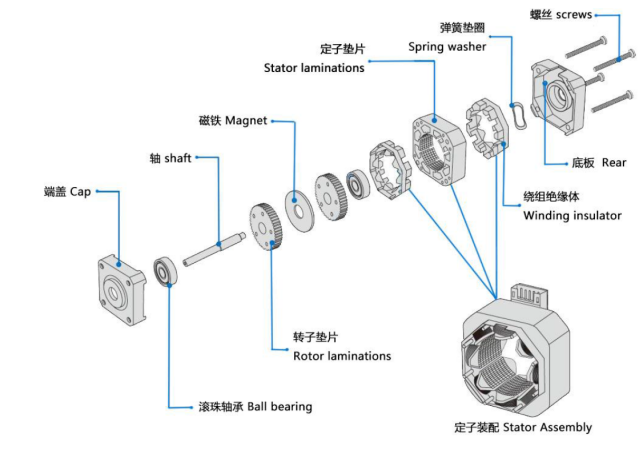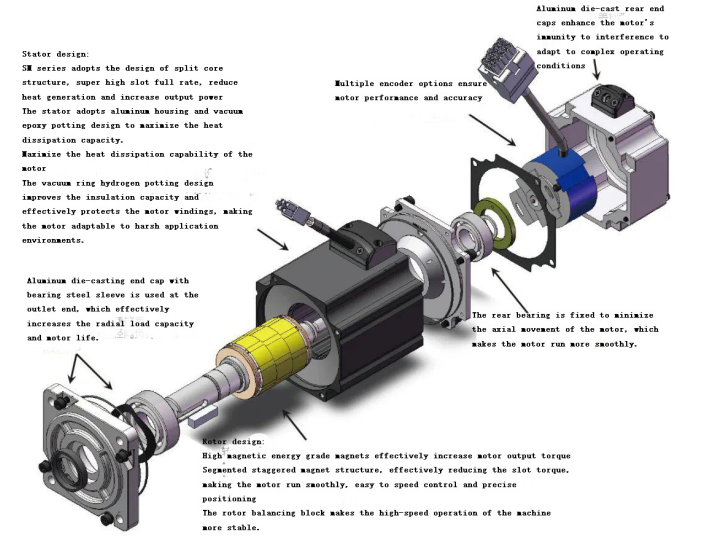Ana buƙatar injina daban-daban a fannoni da dama, ciki har da sanannuninjinan stepperda kuma injinan servo. Duk da haka, ga masu amfani da yawa, ba su fahimci manyan bambance-bambancen da ke tsakanin waɗannan nau'ikan injina guda biyu ba, don haka ba su taɓa sanin yadda za su zaɓa ba. To, menene manyan bambance-bambancen da ke tsakanininjinan stepperda kuma injinan servo?


Motar hidima
1, Ka'idar aiki
Waɗannan injinan guda biyu sun bambanta sosai a ƙa'ida, injin stepper siginar bugun lantarki ce zuwa cikin matsuguni na kusurwa ko kuma matsuguni na layin siginar sashin sarrafa madaukai na buɗewa, duba ƙa'idar aiki na injin stepper.
Kuma servo ya fi dogara ne akan bugun jini zuwa matsayi, injin servo da kansa yana da aikin aika bugun jini, don haka injin servo kowane juyawa na kusurwa, zai aika adadin bugun jini daidai, don haka, da injin servo don karɓar bugun jini ya samar da amsa, ko madauki rufewa, don haka tsarin zai bayyana adadin bugun jini da aka aika da karɓa nawa aka dawo da shi, don haka zai iya sarrafa juyawar injin daidai don cimma daidaiton matsayi.
2, Daidaiton sarrafawa
Ana samun daidaiton motar stepper ta hanyar daidaita kusurwar mataki, wanda ke da gears daban-daban na rabe-raben don cimma daidaiton iko.
Ana tabbatar da daidaiton sarrafa injin servo ta hanyar na'urar juyawa mai juyawa a ƙarshen bayan shaft ɗin motar, kuma daidaiton sarrafa injin servo gabaɗaya ya fi na injin stepper girma.
3, Sauri da iya aiki fiye da kima
Motar Stepper a cikin aiki mai ƙarancin gudu tana da saurin girgiza mai ƙarancin mita, don haka lokacin da motar stepper ke aiki mai ƙarancin gudu, yawanci tana buƙatar amfani da fasahar damping don shawo kan lamarin girgiza mai ƙarancin mita, kamar ƙara dampers akan motar ko drive ta amfani da fasahar subdivision, da sauransu, yayin da motar servo ba shine abin da ke faruwa a wannan yanayin ba, halayen sarrafa madauri na rufewa suna ƙayyade aikinta mai sauri don kiyaye kyakkyawan aiki. Halayen mita na lokaci-lokaci na biyu sun bambanta, kuma gabaɗaya saurin da aka kimanta na motar servo ya fi na motar stepper girma.
Juyin fitarwa na motar stepper yana raguwa yayin da saurin ke ƙaruwa, yayin da motar servo take fitarwa akai-akai, don haka motar stepper gabaɗaya ba ta da ƙarfin overload, yayin da motar AC servo take da ƙarfin overload mai ƙarfi.
4, Aikin Gudun
Injinan Stepper gabaɗaya suna da ikon sarrafa madauri a buɗe, idan akwai yawan mitar farawa ko kuma yawan kaya, zai zama ba za a iya amfani da shi ba ko kuma ya toshe shi, don haka amfani da buƙatar magance matsalolin gudu ko ƙara ikon sarrafa madauri a rufe, duba menene injin stepper mai rufewa. Duk da yake injinan servo suna amfani da ikon sarrafa madauri a rufe, wanda ya fi sauƙin sarrafawa, babu asarar yanayin mataki.
5, Kudin
Motar Stepper tana da fa'ida dangane da aikin farashi, don cimma wannan aiki a yanayin motar servo, farashin ya fi na injin stepper na wutar lantarki iri ɗaya, babban martanin motar servo, babban gudu da fa'idodin babban daidaito suna ƙayyade babban farashin samfurin, wanda ba makawa.
A taƙaice, injinan stepper da injinan servo duka daga ƙa'idar aiki, daidaiton sarrafawa, ƙarfin ɗaukar kaya, aikin aiki da farashi akwai manyan bambance-bambance. Amma duka biyun suna da nasu fa'idodi, masu amfani waɗanda ke son yin zaɓi daga cikinsu suna buƙatar haɗa ainihin buƙatunsu da yanayin aikace-aikacen su.
Lokacin Saƙo: Nuwamba-09-2022
